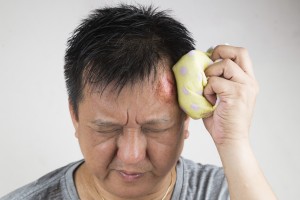A Bump to Your Head Can Be Serious – Know How to Recognize a Concussion

Who hasn’t taken a hard knock to the head at one time or another?
Whether from a fall, a mishap on the sports field, a car crash or an object striking your head or neck, a head injury should never be ignored.
Even when there is no visible damage, a bump can cause a concussion that may have serious impacts such as bruised brain tissue, bleeding inside the brain, nerve damage, brain swelling or seizures.
What Is A Concussion?
A concussion happens when a person’s brain is shaken quickly back and forth after an impact to the head, or from a whiplash-type injury.
Called a mild traumatic brain injury, a concussion is not usually life-threatening, but can result in serious symptoms that require medical attention.
Signs of a Concussion
- Dizziness that persists for more than a few minutes
- A headache that continues after the incident
- Trouble focusing, or blurred vision
- Vomiting or feeling nauseous
- Difficulties with balance
- A hard time concentrating, thinking, or making decisions
- Trouble speaking or saying things that don’t make sense
- Feeling confused, sleepy, grouchy, sad, or emotional for no reason
- Sensitivity to light or noise
Symptoms that require calling 911 immediately
- Inability to wake up from a state of unconsciousness
- Seizures
- Blood or clear liquid draining from the ears or nose
- One pupil is larger than the other
What to do if you think someone has a concussion
 If you or someone near you experiences an injury with a potential concussion, the concussed person should stop the activity they were doing and be diagnosed by a medical physician as soon as possible.
If you or someone near you experiences an injury with a potential concussion, the concussed person should stop the activity they were doing and be diagnosed by a medical physician as soon as possible.
After-concussion activity may intensify the symptoms and increase the risk of further brain injury.
A second brain injury, happening before the first concussion is healed, can be much more dangerous than the first one– even fatal. Read more: 2nd impact syndrome.
How to avoid a concussion
The best way to prevent a concussion is to wear proper helmets and protective gear when engaging in sports or other activities that could result in a head injury.
If you are a sports coach, health care professional or someone responsible for the safety of others, learn how to prevent, recognize and respond to concussions.
Parachute, Canada’s national injury-prevention organization, provides online training and links to many excellent concussion resources.